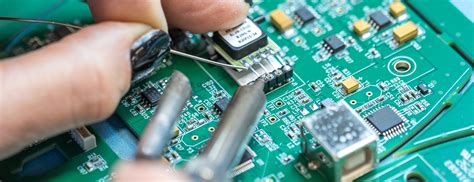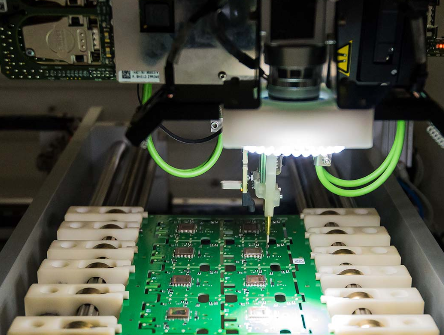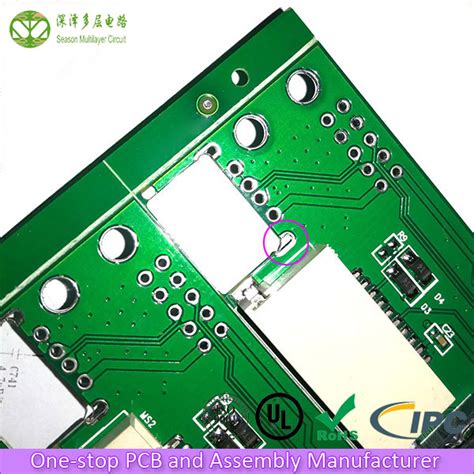Revolutionizing Industries: The Power of Custom Electronic Assembly
Key Takeaways
Custom electronic assembly plays a pivotal role in the contemporary manufacturing landscape, significantly enhancing production capabilities. The process of pcb assembly—which refers to the assembly of electronic components onto a printed circuit board—has evolved, integrating advanced techniques and technologies. By leveraging pcba (printed circuit board assembly), companies can streamline their operations and reduce lead times. This transformation is driven by the need for greater efficiency in manufacturing processes, as well as a constant demand for innovation.
Through tailored solutions, custom electronic assembly enables manufacturers to optimize their workflows while minimizing errors and waste. The flexibility of these assemblies allows for unique designs that meet specific industry requirements, effectively catering to diverse sectors from automotive to consumer electronics. As organizations increasingly adopt such customized approaches, they recognize a substantial decrease in overall costs associated with both production and inventory management.
Moreover, advancements in technology have made it possible to integrate smart designs within pcb assembly, resulting in improved functionality and reliability of products. By embracing these innovative methodologies, companies position themselves at the forefront of their respective industries, ready to tackle future challenges while enhancing their product offerings. As we explore further implications of custom electronic assembly throughout various sectors, it becomes clear that its influence extends far beyond operational efficiency—it fosters a culture of innovation that is essential for sustained competitive advantage.
Understanding Custom Electronic Assembly: A Comprehensive Overview
Custom electronic assembly, often referred to as pcb assembly or pcba, plays a pivotal role in the landscape of modern manufacturing. This process involves the meticulous integration of various electronic components into a unified circuit board, allowing for functionality tailored to specific industry needs. The shift towards custom electronic assembly reflects a growing demand for specialized solutions that enhance operational efficiency while concurrently reducing production costs. As industries strive to remain competitive, investing in custom pcba solutions means adopting cutting-edge technologies and innovations that drive performance.
The complexity of modern gadgets and equipment necessitates a deep understanding of assembly processes, making it essential for manufacturers to leverage custom electronic assembly effectively. By refining techniques, industries are realizing significant advantages not just in terms of speed but also in quality assurance, which is vital in maintaining product integrity. As companies navigate this landscape, they often face challenges related to scalability and integration; however, the rewards of enhanced efficiency and lowered overhead costs outweigh these hurdles.
“Adopting custom assembly solutions is not just about keeping pace; it’s about setting the stage for future innovations.”
In summary, engaging with advanced pcb assembly practices empowers countries to explore new avenues for growth while remaining adaptable to ever-evolving market demands.
The Role of Custom Electronic Assembly in Modern Manufacturing
Custom electronic assembly, often referred to as pcb assembly or pcba, plays a crucial role in modern manufacturing by providing tailored solutions that meet specific industry needs. This approach allows manufacturers to integrate complex electronic components into their products, facilitating the creation of more efficient and reliable systems. By utilizing custom electronic assembly, companies can optimize their designs, reduce lead times, and enhance overall production efficiency. The adaptability of this process is vital for sectors ranging from consumer electronics to automotive and aerospace industries. Furthermore, the ability to customize assembly methods enables manufacturers to implement innovative solutions that align with evolving market demands. As technology progresses, the importance of pcb assembly will only continue to grow, solidifying its position as an essential component in driving productivity and fostering innovation within the manufacturing landscape.
Enhancing Efficiency: How Custom Electronic Assembly Streamlines Processes
The landscape of manufacturing is undergoing a remarkable transformation, largely due to the advent of custom electronic assembly (pcb assembly). This innovative approach allows businesses to optimize their manufacturing processes, ensuring a higher level of precision and speed. By leveraging pcba technology, companies can significantly reduce the production cycle time, thereby increasing overall operational efficiency.
A key advantage of custom electronic assembly lies in its ability to accommodate specific project requirements. Manufacturers can tailor their pcb assembly solutions to meet diverse needs, including size constraints and unique component arrangements. This customization not only enhances the fit and function of electronic devices but also minimizes waste throughout the manufacturing process.
| Aspect | Traditional Assembly | Custom Electronic Assembly |
|---|---|---|
| Production Time | Longer | Shorter |
| Tailoring Capabilities | Limited | Highly Flexible |
| Waste Generation | Higher | Reduced |
| Cost Efficiency | Lower | Increased |
Furthermore, employing advanced techniques in pcb assembly, such as surface mount technology (SMT), allows for the integration of smaller components with greater complexity. This capability paves the way for more compact designs while maintaining or increasing functionality, catering to the demands of today’s market for sleek and efficient gadgets.
In conclusion, through enhancing efficiency and reducing production costs, custom electronic assembly is revolutionizing how industries function. The seamless integration of innovative technologies not only supports existing processes but also sets a foundation for future advancements in the realm of manufacturing.
Cost Reduction Through Custom Electronic Assembly Solutions
In today’s competitive landscape, businesses are increasingly turning to custom electronic assembly solutions to drive efficiency and reduce costs. By leveraging advanced pcb assembly techniques, companies can streamline their production processes and achieve significant savings. Custom pcba services allow for tailored designs that minimize material waste and reduce assembly times, ultimately leading to lower operational costs. Additionally, the ability to integrate various components into a single platform not only simplifies supply chain management but also enhances the speed of prototyping and manufacturing. As organizations embrace these innovative solutions, they are discovering that the flexibility offered by custom electronic assembly can lead to better resource allocation and improved overall productivity. This transformation is crucial for staying agile in an ever-evolving market, ensuring that businesses are not just surviving but thriving in their respective sectors.
Innovative Technologies Accelerated by Custom Electronic Assembly
Custom electronic assembly, particularly through innovations in PCB assembly and PCBA, serves as a catalyst for technological advancements across various sectors. As industries strive for enhanced performance and functionality, the impact of tailored electronic solutions becomes increasingly significant. The integration of advanced automation and precision engineering in custom electronic assembly allows for the rapid development of cutting-edge devices that meet specific consumer needs. For instance, in the automotive sector, the adoption of PCBA techniques has led to smarter vehicle systems that improve safety and efficiency, thereby revolutionizing the driving experience. Furthermore, in medical technology, pcb assembly facilitates the creation of compact, highly specialized devices that offer improved diagnostics and treatment methods. This synergy between custom electronic assembly and innovative technologies not only enhances production capabilities but also fosters creativity and innovation in product development, paving the way for future possibilities in diverse fields.
Case Studies: Success Stories of Custom Electronic Assembly in Various Industries
Custom electronic assembly has made a significant impact across various sectors, showcasing its potential through real-world applications. One prominent example can be found in the automotive industry, where pcb assembly techniques enable manufacturers to improve vehicle safety and efficiency. By integrating smart technologies into vehicles, companies have been able to develop systems that monitor real-time performance, leading to enhanced driving experiences. In the realm of medical devices, custom pcba solutions are pivotal in producing high-precision instruments essential for patient care. These assemblies not only enhance functionality but also ensure compliance with stringent industry standards.
Furthermore, the consumer electronics market has seen revolutionary changes due to custom electronic assembly. Companies leveraging advanced pcb assembly processes can rapidly introduce innovative products, such as wearables and smart home devices, which cater to constantly evolving consumer needs. The telecom sector is also experiencing transformation as firms harness custom electronic assembly to create high-capacity networking equipment, driving improvements in connectivity and speed.
These case studies illustrate the versatility and effectiveness of custom electronic assembly across diverse industries, underscoring its role as a catalyst for innovation and efficiency. As organizations continue to recognize the benefits of tailored solutions in their manufacturing processes, the future holds great promise for this transformative technology.
Future Trends in Custom Electronic Assembly: What to Expect
As industries continuously evolve, the future of custom electronic assembly is poised to bring revolutionary changes. We can expect significant advancements in pcb assembly techniques that will lead to enhanced flexibility and adaptability in manufacturing processes. The integration of smart technologies is already making waves, allowing for real-time monitoring and control of production lines. This shift suggests that within a few years, we may witness a marked increase in the use of pcba processes that leverage Artificial Intelligence for efficiency, thereby reducing human error and operational downtime.
Moreover, sustainability will likely become a central theme in custom electronic assembly practices, as companies seek to minimize their environmental footprint. Eco-friendly materials and energy-efficient methods will be at the forefront of innovation, making it imperative for manufacturers to adapt. Additionally, the trend toward miniaturization will push the boundaries of pcb assembly, fostering the need for more intricate designs without sacrificing performance or functionality.
In terms of market demand, we can anticipate a growing interest in customized solutions tailored to specific industry needs. Businesses will increasingly rely on custom electronic assembly services to produce specialized products that meet diverse consumer requirements. Consequently, this trend towards personalization may very well drive significant growth in various sectors, from automotive to healthcare.
In conclusion, the future landscape of custom electronic assembly is bright with potential; it stands on the brink of technological breakthroughs that promise not only improved efficiency but also revolutionary ways of delivering high-quality products tailored specifically for evolving market needs.
Overcoming Challenges in Implementing Custom Electronic Assembly Solutions
Implementing custom electronic assembly solutions can present various challenges for organizations aiming to enhance their manufacturing processes. One of the primary hurdles is the integration of advanced technologies into existing workflows, which often requires significant adjustments in both techniques and tools. Companies may find it daunting to effectively incorporate PCB assembly or PCBA methods without disrupting their operational flow. Additionally, navigating the complexity of supply chains for electronic components can pose difficulties, particularly when sourcing high-quality parts that meet specific customization requirements. Staff training also plays a crucial role; ensuring that team members are adept in using newly adopted technologies is essential for achieving maximum efficiency. Another significant challenge lies in managing costs while innovating. Organizations need to strategically evaluate their investment in custom assembly solutions to balance quality and affordability effectively. Finally, fostering strong collaboration between engineering and manufacturing teams is key, as successful implementation relies on seamless communication and alignment on project goals. By addressing these challenges head-on, businesses can unlock the transformative potential of custom electronic assembly, paving the way for enhanced productivity and innovative solutions across industries.
Conclusion
In summary, the rising adoption of custom electronic assembly is profoundly influencing various sectors, ultimately enhancing overall efficiency and productivity. As industries increasingly rely on pcb assembly and pcba technologies, the ability to create tailored solutions is becoming a crucial factor in competitive advantage. Enhanced automation and precision offered by custom electronic assemblies not only reduce operational costs but also empower businesses to innovate with speed and agility. By leveraging advancements in materials and manufacturing processes, companies are able to adapt rapidly to market demands while ensuring superior quality in their products. The future of industries is closely intertwined with these developments, as custom electronic assembly continues to drive transformative changes across the technological landscape.
FAQs
What is custom electronic assembly?
Custom electronic assembly refers to the tailored process of assembling electronic components into a functional product, often involving pcb assembly and pcba techniques designed to meet specific customer requirements.
How does custom electronic assembly enhance efficiency?
By utilizing specialized processes and precise technology, custom electronic assembly streamlines production, leading to greatly enhanced efficiency in manufacturing timelines and reducing the potential for errors.
What are the cost benefits of custom electronic assembly?
Custom electronic assembly can significantly lower costs by optimizing resource allocation, minimizing waste, and allowing for bulk production of pcba without compromising quality.
Can you give examples of industries benefiting from custom electronic assembly?
Industries such as automotive, healthcare, and consumer electronics have seen transformative impacts through the implementation of custom electronic assemblies, resulting in innovative product development and improved operational efficiency.
What innovative technologies are emerging in this field?
Current innovations include advancements in pcb assembly, automation techniques, and advanced materials that facilitate the production of more complex designs while maintaining reliability.
How can businesses overcome challenges in implementing custom electronic assembly?
To address difficulties such as integration into existing systems or managing supply chain complexities, businesses should conduct thorough planning, invest in training staff, and collaborate with experienced partners to ensure smooth execution.
Interested in Custom Electronic Assembly?
For more information on how custom electronic assembly, including pcb assembly and pcba, can revolutionize your business processes and drive innovation, please click here.







